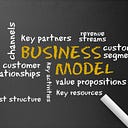All The Things You Need To Know About Business Model Innovation
In the last years, I’ve been dissecting business models of any type, and companies of any size. At the same time, I’ve been talking, interviewing, and discussing and business model innovation with dozens of entrepreneurs and practitioners.
I’ve been doing that for several reasons:
- To gain a better understanding of businesses around me. As I had the option to gain a Ph.D. on the topic or to create my Ph.D. I went for the latter, and in the process, I thought to document it all on FourWeekMBA. Over time I wanted to create the business school I always dreamed of.
- Business models enabled me to gain insights into how companies worked at a holistic level so that I could become a better digital entrepreneur.
- Business modeling also helped me test the assumptions around the business I was trying to build, thus reducing the time or potential financial resources spent on a project which was doomed to failure.
In short, I found myself using business modeling for several reasons, and those I believe are all legitimate.
At the same time, while researching the topic with the mindset of an entrepreneur but the depth of reach of a Ph.D. I noticed how business model and business model innovation had become widely adopted concepts. And also (and probably for that reason) widely misunderstood.
Let me then clarify a few things that I’ve found out over the years, which if you’re starting out; but also if you’re passionate about the topic might help make sense of it.
Business model innovation enables you to create competitive moats
As technology becomes over time a commodity, creating a lasting advantage requires business model understanding, experimentation, and execution.
That’s because business model innovation shifted the focus from the competition; which is what in the last decades we’ve all been looking at with frameworks like Porter’s Five Forces, to customers.
Without going through all the reasons why that happened today, business model innovation has become more important than technical innovation.
A quick caveat, before we move on.
When I say that the focus has shifted to customers, it doesn’t mean that you don’t need to understand your competition. It just means you need to start from customers and the problems they face. Only after that, you want to move to competition and what existing alternatives exist.
A multi-faceted concept
Although we like to give a single definition to each of the concepts we know. Those concepts will adapt based on the context they sit into.
In short, that is fine to have multiple definitions of the concept, based on the objective that each practitioner might have.
Therefore, it’s okay that a concept translated in several fields will have different meanings.
Thus, let’s see some of those meanings.
Analysts use business models to produce financial analyses
Business modeling can be seen as a technique to dissect any organization and business for analysts and business people trying to gain a better understanding of those businesses.
Business and financial analysts use business modeling to have a better understanding of tech companies. They do it to give investment recommendation, financial reviews, and investment advice.
Academics study business models for the sake of classifying things
For academics, a business model might be just a holistic way to describe a business. And the purpose of an academic might seem more rigorous than an entrepreneur. The academic has to prove the business has certain features that make it different or similar to other businesses.
And from those features, the academic will derive classifications, that as they become more and more complex only live in theory land.
The research, therefore, doesn’t have necessarily a practical purpose. But instead the goal of uncovering universal classification systems for things in the real world. As such, they might lose a practical application.
Most people confuse business models for business plans
Among the top results, Google suggests “How to write a business model” when typing “how to … business model. When you click on the result that Google suggested, see what happens.
When you click on the Google suggested result for “How to write a business model,” you get “how to write a business plan.”
For most people (those that didn’t study the topic), business models often resonate with business plans. I noticed it when I started to research the topic.
As Google makes accessible the searching data and behaviors of billions of people, it also adapts to those search behaviors.
To my surprise, in the past, I noticed how for the query “how to write a business model,” Google served results around “how to write a business plan.”
I’ve learned to appreciate those “mistakes” as Google is a commercial search engine. And as such, it follows what most people search. If collectively people think that a business model is a business plan, Google might enable that to be true.
This means that if you are an entrepreneur searching for valuable resources either you are lucky to find the resource you need or you might end up writing a hundred-page business plan which won’t help much with your business.
If at all will prevent you from starting it. As you will start making things more complicated than what they should be.
Startups confuse business models for monetization strategies
An example of how Airbnb “confused” its business model for its monetization strategy (Slideshare)
How WeWork described its business model in the report before the IPO. You might notice that what they’re talking about is their revenue generation strategy. (WeWork Financials)
And for many startups, business model resonates with monetization strategies. I’m not saying this is right or wrong; it’s just what it is.
Overall that is fine. Startup pitches or financial forms are in many cases, also a marketing tool meant to communicate and simplify a concept.
Thus, if most investors want to know about your business model but what they mean is how you make money, that is fine to simplify it.
However, as an entrepreneur, if you do believe yourself that a business model is how you make money that might limit your options, as all day long you’ll think about monetization strategies, rather than having a more holistic and strategic approach.
Business model innovation is an experimentation mindset for entrepreneurs
Business model design is not about sketching a plan on a piece of paper, but rather a mindset of experimentation.
In business modeling, you can manufacture experiments (business models, and business model variations) that enable the entrepreneur to test the assumptions around the business quickly, cheaply, and with minimum effort.
It is important to start testing (as practitioners like Ash Maurya highlighted) from the riskiest assumptions.
Those assumptions for which the business might not become sustainable over-time. Things like monetization strategy or key customers understanding are some of the riskiest assumptions , and they need to be tested, quickly.
An entrepreneur is not a scientist
An entrepreneur has different goals than a scientist. Where the scientist might try to uncover more universal truths. The entrepreneur needs business model experimentation to test the assumptions, uncover market opportunities, reduce the time to market, and eventually build a valuable business.
In short, an entrepreneur is a market-driven animal. Rather than starting from theories to find if that is true through experiments. An entrepreneur starts from a problem, and she, or he goes back to theory to understand what are the underlying assumptions which are preventing the business to succeed.
Once those assumptions have been streamlined, they can be tested, so that the entrepreneur can move on and make the product or service in target with the market.
Business model innovation is at the same time a mindset, a framework and a set of tools for entrepreneurs
Business model innovation, therefore, can be seen as a mindset, framework, and a set of tools for entrepreneurs to build relevant businesses in today’s marketplace.
Key takeaways
Business model innovation is a popular topic, and as such, there are a lot of misconceptions around it.
In my research around the topic, I’ve figured the reasons behind those misconceptions and how and why they exist.
We also uncovered how business modeling has a meaning based on the reason why you’re using it. At the end of it all, business model innovation is a dynamic concept, at the apex of its evolution, and as such, it’s interesting to see how it can have different meanings and interpretations.
At the same time, if you’re an entrepreneur, it’s essential to understand what it can do for you, and this article might clear things up.
Read Next: Business Models Guide.
Originally published at https://fourweekmba.com on September 2, 2019.

